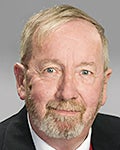Are you what you read?
Published 5:19 pm Saturday, June 3, 2017

- Ray Mosby
“Outside of a dog, a book is man’s best friend. Inside of a dog, it’s too dark to read.”—Groucho Marx
I am of the opinion that you can judge an owner by his books.
Not too long ago, a fellow who is, to a moral certainty, on the waiting lists of no medical schools, said to me: “Editor, you claim not to be either one, but I really can’t tell if you are a Democrat or a Republican. Which one are you?”
What I started to say to him was “that’s because I really am neither, you twit,” but what I said instead was: “Well, that’s probably because I am a bibliophile.” The subsequent blank look on his face probably provided me with a little more amusement than I should have taken.
In a more civilized time than is today’s, it was thought that one way in which to take the measure of a man was to take careful notice of what lined his bookshelves. In today’s intellectual shorthand, that would be sort of a “you are what you read,” kind of thing.
Or course, that line of thought was predicated on the once sound, now not so, premise that people actually did read, prior to the relatively recent abominable practice of one’s buying books by the pound, hoping to create the illusion of literacy. (One need not be crazy about everything French to appreciate the aptness of their aversion to the “nouveau riche.”)
However, since a profound interest in what makes people tick is one which has remained with me over the years, I thought it might be interesting to engage in a little self analysis along this line. What conclusions might someone else draw from an inventory of my bookcases? So, I (without being so tacky as to count) took inventory, and what I found was both predictable and not so.
I have a great many text books and reference books on a great many topics, but those are pretty much job requirements for a newspaper editor. Similarly, there are lots of tomes on the practice of journalism and lots of books written by those who’ve practiced it, but that again, goes (or should, anyway) with the territory.
But what about all the others? Well, a nice word for the contents of my book collection would be eclectic.
I have some of the classics — Plato, Aristotle, Homer, Joyce, Dante, Milton, Chaucer and the like — but I also have an almost complete collection of the works of Stephen King, whose name is not often mentioned in connection with those of the other gentlemen of letters.
I have several copies of The Holy Bible, but I also have several copies of the collected wisdoms of George Carlin, in which little Bible-friendly is to be found. I own the “must have” modern works of Melville, Twain, Faulkner, Crane and Hemingway, but I also have the now out-of-print complete collection of what I consider to be the greatest mystery writer ever, Philip MacDonald, of whom many have never heard.
I have a rather extensive collection of historical works written by and about one John Singleton Mosby, but that doesn’t count because he’s kin to me, and a complete set of the novels of Thomas Harris, which doesn’t count either, because he’s practically kin to me.
There are books written by Nixon, Haldeman and Erlichman, but there are also books by Woodward, Bernstein, Kissinger and John Dean.
Thanks to the generosity of the DeCell family, I have the collected works of Allen Drury and Fletcher Knebel, from which I have imagined many a “what if?” over the years, and which I treasure.
There’s a Southern flavor in Harper Lee and Willie Morris, and Truman Capote’s brilliant and underrated “Other Voices, Other Rooms.”
There are Salinger and Heller, Fitzgerald, and Sinclair Lewis. They sit alongside Poe and Frost and Sandberg and all the great English poets. Of course, there is Shakespeare, but there are also anthologies of horror movies and Rock ’n’ Roll and Sun Tzu’s “The Art of War.” Trying to reconcile those might make your head hurt.
Undoubtedly my most “valuable” book is an early edition illustrated copy of “Frankenstein,” joined on its shelf by Stoker’s “Dracula,” but on the next shelf is C.S. Lewis’ “Mere Christianity.” Go figure.
So am I what I read? Ah, ah, remember, I prefer eclectic.
Ray Mosby is editor and publisher of The Deer Creek Pilot in Rolling Fork.





